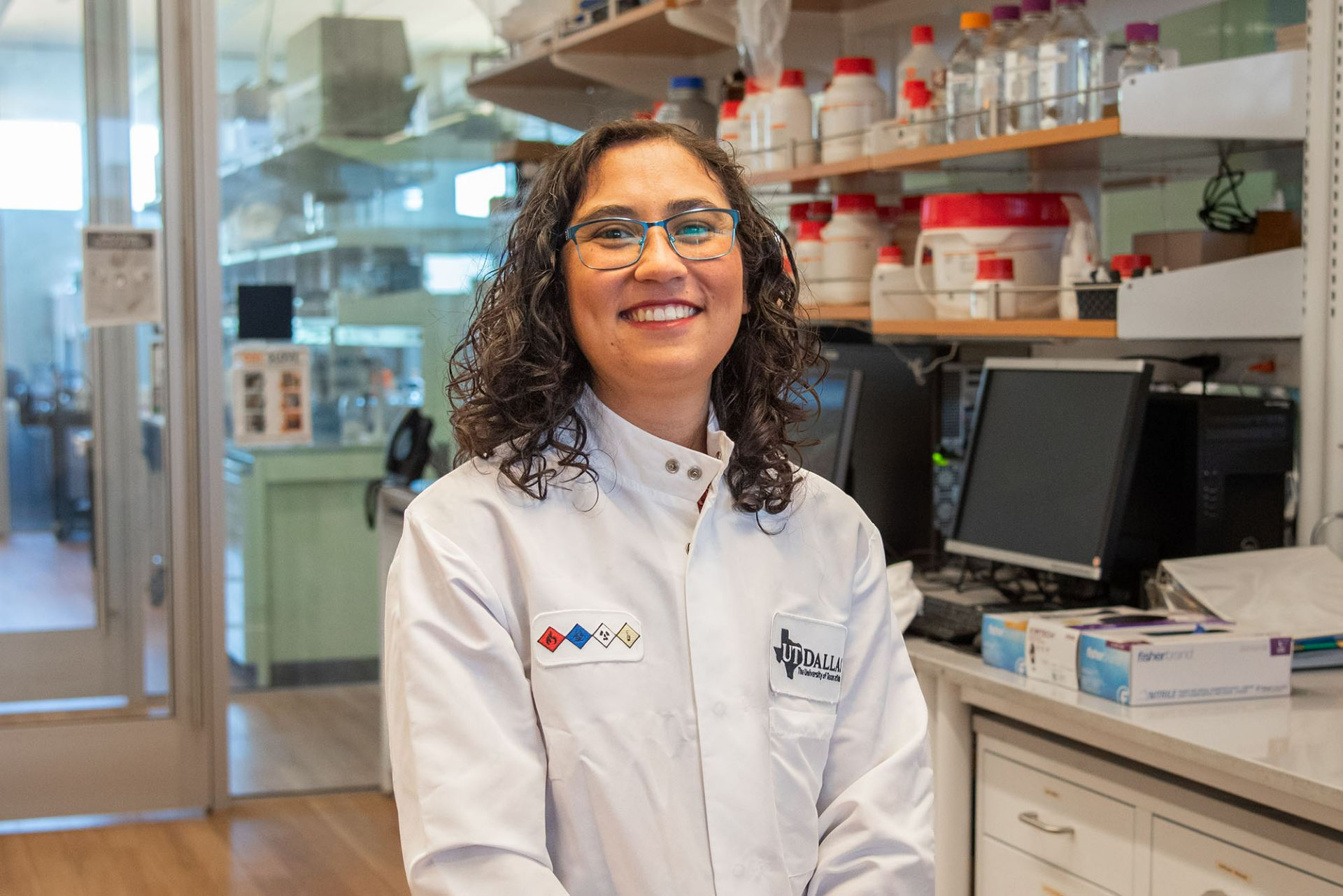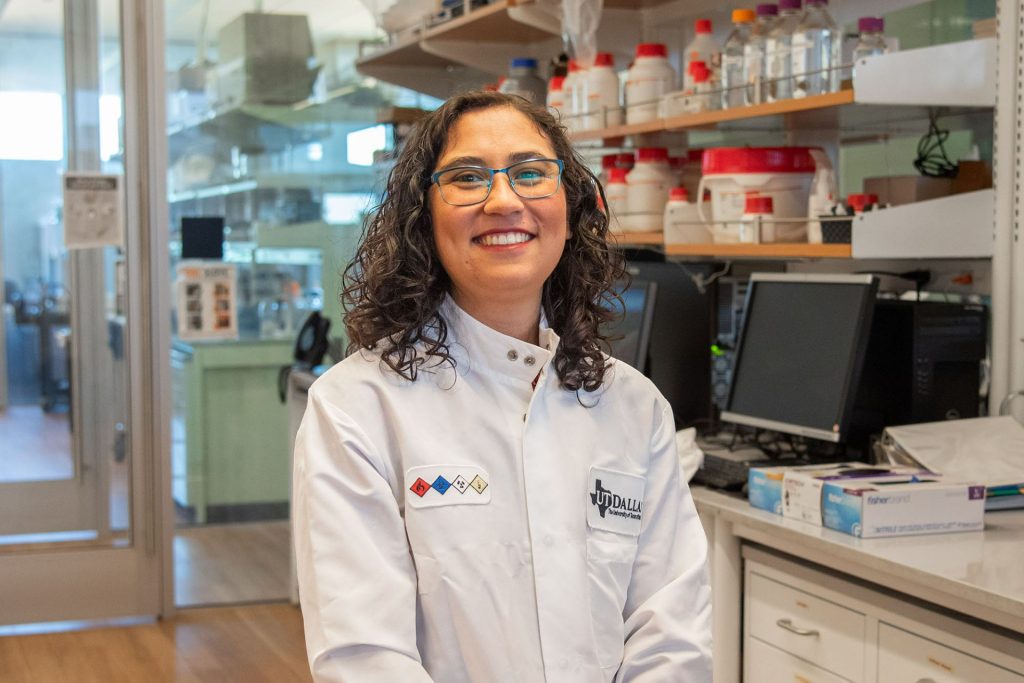
A University of Texas at Dallas bioengineering researcher has received a National Institutes of Health (NIH) career transition grant to develop therapies using vagus nerve stimulation (VNS) to improve bladder function for spinal cord injury patients.
The MOSAIC (Maximizing Opportunities for Scientific and Academic Independent Careers) award provides funding for promising postdoctoral researchers and continues to support their research as they transition to faculty positions at research-intensive institutions. The grant from the NIH’s National Institute of Neurological Disorders and Stroke is anticipated to provide a total of just under $1 million over five years.
Ana Hernandez-Reynoso PhD’21 is the first UT Dallas recipient of a K99/R00 award in more than a decade. Dr. Karen M. Rodrigue and Dr. Kristen Kennedy, both professors of psychology in the School of Behavioral and Brain Sciences, received awards as UTD postdoctoral researchers in 2010.
“We’re trying to teach the nerves that have no damage to compensate for the ones that can no longer do their original job.”
Ana Hernandez-Reynoso PhD’21
“Ana’s accomplishment speaks to the nurturing and supportive environment that UTD offers early career researchers. Ana is a shining example of a Comet who has been able to embrace this environment and be awarded a K99/R00,” said Dr. Shalini Prasad, professor and department head of bioengineering and a Cecil H. and Ida Green Professor in Systems Biology Science in the Erik Jonsson School of Engineering and Computer Science.
Researchers from UTD’s Texas Biomedical Device Center (TxBDC) conceived a therapy involving VNS to rewire circuits in the brain more than a decade ago. VNS uses a device to stimulate the vagus nerves, which run from the brain to the stomach on each side of the body, with electrical impulses. Scientists in the TxBDC have refined the technique to treat a variety of disorders, including stroke and spinal cord injury. In August 2021 the Food and Drug Administration approved their rehabilitation system for chronic ischemic stroke survivors, making it the first such treatment of its kind.
Hernandez-Reynoso’s project builds upon the previous success of VNS and aims to restore bladder function, which is among the top priorities for restoration after a spinal cord injury.
VNS Research
Learn more about UTD researchers’ vagus nerve stimulation discoveries in News Center and UT Dallas Magazine.
“When we think about spinal cord injury, we typically think everything is absolutely interrupted and there is no conduction of the signals from the brain to any part of the body anywhere else,” Hernandez-Reynoso said. “In reality, most injuries are incomplete, meaning that there are still some pathways intact. We’re trying to teach the nerves that have no damage to compensate for the ones that can no longer do their original job.”
Hernandez-Reynoso became interested in neural engineering when she studied at the Georgia Institute of Technology as part of an exchange program with her undergraduate university, the Monterrey Institute of Technology and Higher Education in Mexico.
“After I came back, I was like, OK, this is what I want to do,” she said. “I needed more experience, so I completed a master’s in computer science while doing research on the bioelectric potentials of the brain with electroencephalography and functional near-infrared spectroscopy.”
At a seminar in Mexico, she met a UTD bioengineering professor, who invited her to join his lab to study the nerves related to urinary function in the pelvic floor muscles.
After earning her PhD in biomedical engineering, Hernandez-Reynoso expanded her work to focus on the interface of the peripheral nervous system with the central nervous system. She is currently collaborating with Dr. Seth Hays, associate professor of bioengineering and Fellow, Eugene McDermott Distinguished Professor, to apply VNS therapy to help spinal cord injury patients recover lost bladder function.
Hernandez-Reynoso will conduct preclinical and clinical research with 15 spinal cord injury patients who have VNS implants. By modifying current VNS parameters, the researchers hope to improve patients’ bladder efficiency.
“This award combines Dr. Hernandez-Reynoso’s prior experience in bladder function and neuromodulation in a meaningful way to develop new ways to treat spinal cord injury,” Hays said. “I’m hopeful this builds a great launching point for a successful independent career in neural engineering.”
Her other mentors include Dr. Joseph Pancrazio, vice president for research and innovation and professor of bioengineering at UT Dallas; Dr. Philippe Zimmern, professor of urology at UT Southwestern Medical Center; and Dr. Margot Damaser, a biomedical engineering researcher at the Cleveland Clinic.
